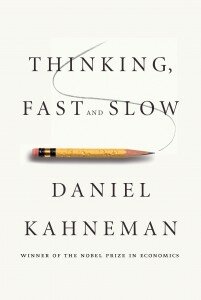Posts Tagged ‘Thinking fast and slow’
Loss aversion looms large in branding
Not long ago I believed sustainable business, renewable energy and the socially responsible consumer were on the verge of going mainstream. I know they will get there eventually, but that day now seems farther away.
Those of us impatient for change — in our organizations, among our customers, within society — would do well to sit with this fact: People are more motivated to avoid losses than to achieve gains. How much more? About twice as motivated.
This is just one of many thought-provoking research findings explained by preeminent psychologist Daniel Kahneman in his latest book, “Thinking, Fast and Slow.”
This is my second post exploring what some of Kahneman’s findings could hold for brands and the organizations and leaders managing them. Earlier I looked at the distinction between plausibility and probability in the brand stories we tell. Here I’m interested in what humans’ deep-seated aversion to loss means for purveyors of change. (more…)
Is your brand story merely plausible?
Some years ago I led the public relations launch of a next-generation “bet your company” software platform for my employer at the time. The product promised to transform an industry and ensure the business retained its star status. Those of us charged with the product marketing did a fabulous job of storytelling. We had the national trade media eating out of our palms, giving us positive, prominent coverage in one publication after another.
But there was one small problem: Our firm never delivered the product — at least not nearly as advertised.
We had sold an incredible story, not an incredible product.
Today, I am looking back at that experience through the lens of one of the most provocative books I have read in years: “Thinking , Fast and Slow” by Daniel Kahneman, winner of the 2002 Nobel Prize in Economic Sciences. Kahneman is actually a psychologist but his work around decision making challenged the prevailing rational model of judgment in economics. He is professor emeritus at Princeton University. (more…)
, Fast and Slow” by Daniel Kahneman, winner of the 2002 Nobel Prize in Economic Sciences. Kahneman is actually a psychologist but his work around decision making challenged the prevailing rational model of judgment in economics. He is professor emeritus at Princeton University. (more…)

